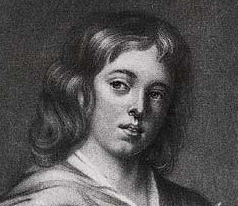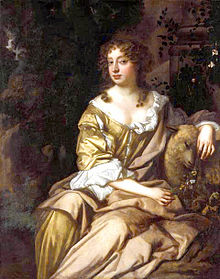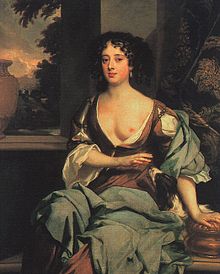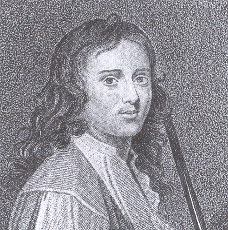Willian Wycherley, The Country Wife, Study Questions
1. What do you make of the names in this play: Horner, Pinchwife, Sparkish, Fidget, Squeamish? How do you interprety "Margery Pinchwife," the "CountryWife"?
2. What is the relation of the Horner plot and the Alithea-Harcourt subplot?
3. What does "repartee" mean and what does it have to do with this play? See also the wit for a relevant use of the term "repartee."
4. If you were directing this play, would you treat it as a farce or a satire?
5. There were numerous contemporary critiques of Restoration drama; one of the strongest was Jeremy Collier's A Short View of the Immorallitly and Profaneness of the English Stage (1698). On the basis of The Country Wife, would you agree with Collier's condemnation? Or would you defend this play?
"Their liberties in the following particulars re intolerable, viz., their smuttiness of expression; their swearing, profaneness, and lewd application of Scripture; their abuse of the clergy, their making their topi characters libertines and giving them success in their debauchery."
"[W]hat can be the meaning of such a representation unless it be to tincture the audience, to extinguish shame, and make lewdness a diversion? This is the natural consequence, and therefore one would think 'twas the intention too. Such licentious discourse tends to no point but to stain the imagination, to awaken faolly, and to weaken the defenses of virtue. it was upon the account of these disorders that Plato banished poets his Commonwealth. . . . "
Qtd in Norton Critical Edition of Restoration Comedy, pp. 391, 393). But see discussion of "the immorality of the English stage" in our anthology (BABL).
6. Read the following comments together. How do they contradict each other? How do they seem to coincide? Are any of them helpful to you in your reading?
Thomas Babbington Macaulay (19th c.) (qtd. Restoration Drama, ed. John Loftis, p. viii): "And yet it is not easy to be too severe. For in truth this part of literature is a disgrace to our language and our national character. it is clever, indeed, and very entertaining; but it is, in the most emphatic sense of the words, 'earthly, sensual, develish.' Its indecency, though perpetually such as is condemned . . . is not, in our opinion, so disgraceful a fault as its singularly inhuman spirit."
L.C. Knights (20th c.): "It has no significant relation with the best thought of its time." "The criticism that defenders of Restoration comedy need to answer is not that the comedies are 'immoral,' but that they are trivial, gross, and dull."
Christopher Hill (20th c.) (in Century of Revolution, p. 217): "Too often the Restoration attitude is regarded merely as a reaction against Puritanism. It was that; but Restoration comedy, a comedy of manners, also comments sceptically on a world in which aristocratic standards were adjusting themselves to a society dominated by money. Hence the dramatists' obsession with the relation of the sexes . . . . Restoration comedy discusses the relation of the sexes among those classes whose marriages are property transactions and therefore exclude love; and tilts against the potential hypocrisy in sentimental idealization of marriage."
7. Why is this play called The Country Wife?
8. What questions would you like to add? (You could put them on the message board.)
9. Thinking further (partly in order to think about writing under pressure):
OBSERVATION - INFERENCE - INFERENCE (OII)
OTHERWISE KNOWN AS Observation--So what?--So what?
Steps in thinking about the reading:
1.Observation. 2. "So what?" 3. Further "So what?"
Observation: Characters compare sex to eating.
Evidence for Observation:
Horner to Pinchwife re: Marjorie: "Why if she be ill favored, there will be less danger here for you than by leaving her in the country; we have such variety of dainties that we are seldom hungry.
Dorilant adds: "[B]ut they have always coarse, constant, swingeing stomachs in the country" (I, i, 374ff., pp. 20-1).
Pinchwife, rejecting a mask for Marjorie: "A mask! No--a woman masked, like a covered dish, gives a man curiosity and appetite, when, it may be, uncovered, 'twould turn his stomach; no, no" (III, i, 105, p. 52).
Lady Fidget to Horner: "But I wonder at the depraved appetites of witty men . . . . Pray tell me, beast, when you were a man, why you rather chose to club with a multitude in a common house for an entertainment than to be the only guest at a good table.
Horner in reply: "[P]eople always eat with the best stomach at an ordinary, where every man is snatching for the best bit" (V, iv, 73ff., p. 127).
So what? The play views sex reductively--as a physical appetite.
Further so what? The comparison is in one sense reductive merely by being naturalistic (sex is as routine and as necessary as eating), but it's also reductive in a specifically gendered way--the women are usually the food.
This principle about sexual appetite is not new, but its expression in such an explicit way, as if the whole society understood and agreed, was new.
10. What's next? Or READING AFTER O I I.
a. Look for other "reduction by naturalizing" moves. See, for example, the conversation between Mrs. Dainty Fidget and Lady Fidget about crossbreeding and dogs and horses.
b. Look for other reductive patterns.
c. Look for connections between the patterns you find.
Example
Observation: The women in the "virtuous gang" are inept in their use of language. They talk around the topic, hinting at it awkwardly.
Evidence for Observation:
Lady Fidget (to the gang): "[T]o report a man has had a person, when he has not had a person, is the greatest wrong in the whole world that can be done to a person" (II, i, 36).
Lady Fidget to Horner: "[B]ut if upon any future falling out, or upon a suspicion of my taking the trust out of your hands, to employ some other, you yourself should betray your trust, dear sir? I mean, if you'll give me leave to speak obscenely, you might tell, dear sir" (II, i, 546 ff.).
So what? "You might tell" is not usually regarded as an obscenity. Like the men, these women want to convey a meaning without actually saying it (to gain the benefit of implicit meaning without explicit expression). But unlike the men, they seem not to have access to wit (or at least not to the continual practice of wit). Their language avoids rather than solves the problem
So what? The virguous gang obviously talk about sex--just incompetently. The wits, on the other hand, express sexual meanings through metaphor, revealing even while they are concealing. And they take attention toward the pleasure derived from the comparison, toward the language itself.
(NB: Alithea is witty--but not nearly as witty as some Restoration women characters are. Wit remains a mostly male territory, but some women excel at it.)
(NB: Pay special attention to Lucy--the wily servant, whose capacity for wit is a) as great as Horner's is and b) necessary to get him off when his stratagem fails.)
Another example, using a definition
Observation-- "Repartee is a fencing term used to describe witty verbal conflict, in which people strive to outdo each other in wit, or twist an opponent's words to their own ends." (See Literary Terms for this definition of wit.)
So what? Wit is a means of engaging in conflict.
So what? Application of definition to play: Wit is the necessary weapon for engaging in this essentially competitive, antagonistic world.
Observation: Marjorie Pinchwife doesn't have the proper weapon to engage in the conflict between men and women that the play stages. Neither do the women in the virtuous gang.
So what?
Question: Do you see any further connections between the observations here? Would you use the same evidence to make different observations and draw different conclusions?
The actresses below were famous Restoration figures. The actors were in the first production of The Country Wife.Cast:
Charles Hart as Horner Elizabeth Boutell as MargeryPinchwife Michael Mohun as Pinchwife Elizabeth James as Alithea Edward Kynaston as Harcourt Elizabeth Knepp as Lady Fidget Joseph Haines as Sparkish Katherine Corey as Lucy William Cartwright as Sir Jasper Fidget
Edward Kynaston, sometimes played women's roles. Played Harcourt in the first production of The Country Wife.
Portrait of Nell Gwynn by Sir Peter Lely, c. 1675. Restoration actress and famous mistress of Charles II.
Portrait of Margaret Hughes by Sir Peter Lely, c. 1670. Restoration actress.Michael Mohun. Restoration actor. Played Pinchwife in first production of The Country Wife.
Theatre at Drury Lane as designed by Cristopher Wren in 1674



